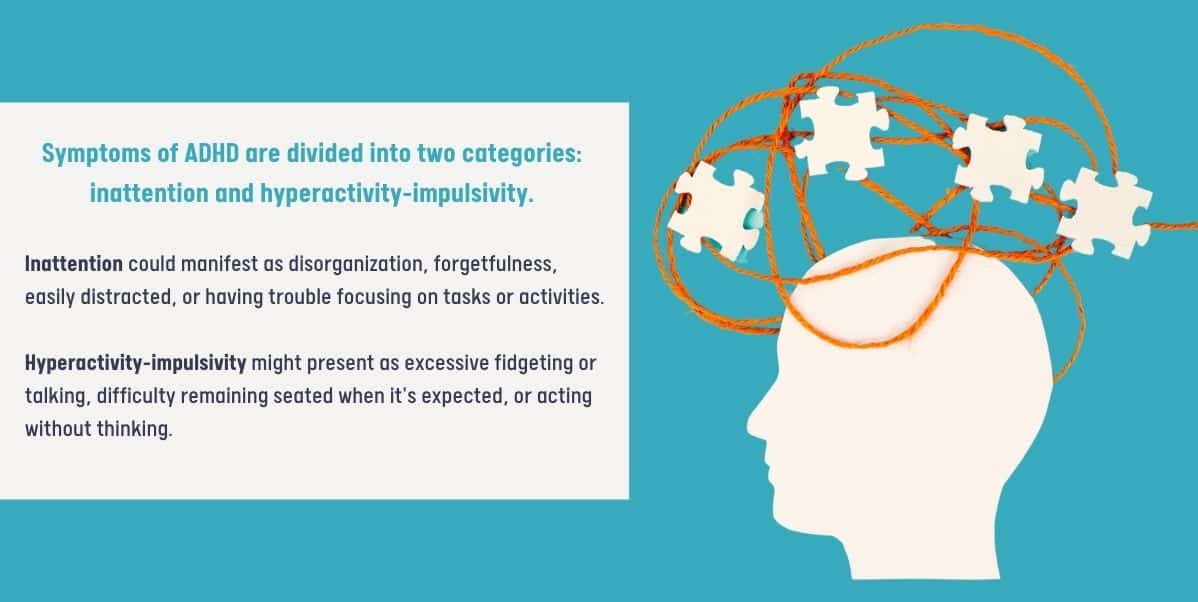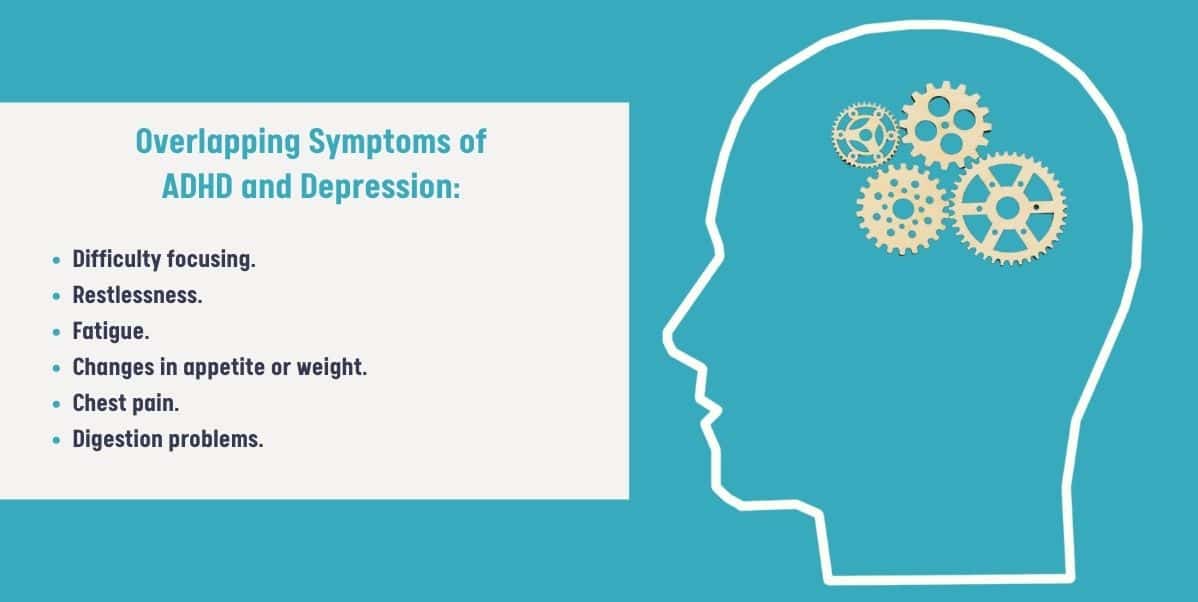
In the complex world of mental health, it’s not uncommon to question our feelings and behaviors. “Do I have ADHD or Depression?” This is a question many individuals grapple with due to overlapping symptoms like difficulty focusing, restlessness, and mood swings.
In this article, we delve into the intricacies of Attention Deficit Hyperactivity Disorder (ADHD) and Depression, two conditions often misunderstood and misdiagnosed. We aim to unpack their similarities, differences, and how they can coexist, offering a clearer understanding for those feeling lost in a haze of symptoms.
Whether you’re seeking answers for yourself or a loved one, our goal is to empower you with knowledge, shedding light on these mental health conditions.
Understanding ADHD
Attention Deficit Hyperactivity Disorder (ADHD) is a neurodevelopmental disorder that affects both children and adults. It’s characterized by persistent patterns of inattention, impulsivity, and hyperactivity that interfere with daily functioning or development.
Symptoms of ADHD
Symptoms of ADHD are divided into two categories: inattention and hyperactivity-impulsivity.
Inattention could manifest as disorganization, forgetfulness, easily distracted, or having trouble focusing on tasks or activities.
Hyperactivity-impulsivity might present as excessive fidgeting or talking, difficulty remaining seated when it’s expected, or acting without thinking.
It’s important to note that these symptoms must be ongoing and impact at least two areas of an individual’s life, such as work, school, or relationships, to be considered ADHD. The symptoms should also not be explained by another mental disorder.

Diagnosing ADHD
Diagnosing ADHD involves several steps and cannot be done in a single appointment. It requires a comprehensive evaluation by a licensed clinician, such as a pediatrician, psychologist, or psychiatrist with expertise in ADHD.
The assessment usually involves gathering information from multiple sources, including parents, teachers, and other adults who interact with the child. For adults, this could involve their partner or other close contacts.
The clinician will also consider the person’s history of childhood behavior and school experiences, and may use standardized rating scales to document the presence of ADHD symptoms.
Remember, only trained healthcare providers can diagnose or treat ADHD. If you’re experiencing symptoms, seek professional help.
Understanding Depression
Depression, also known as Major Depressive Disorder, is a common and severe medical illness that negatively affects how you feel, think, and act. It’s characterized by a persistent feeling of sadness or a lack of interest in outside stimuli.
Symptoms of Depression
Symptoms of depression can be diverse and vary from mild to severe. They may include:
- Feelings of sadness or hopelessness
- Loss of interest or pleasure in activities once enjoyed.
- Changes in appetite.
- Weight loss or gain unrelated to dieting.
- Trouble sleeping or sleeping too much.
- Loss of energy or increased fatigue.
- Feeling worthless or guilty.
- Difficulty thinking, concentrating, or making decisions.
- Thoughts of death or suicide.
Diagnosing Depression
Diagnosing depression involves a thorough evaluation by a healthcare provider. The provider may conduct a physical exam, an interview, and lab tests.
They will also review the patient’s history and symptoms and assess their mental status to rule out other disorders. More often than not, they use certain criteria from the Diagnostic and Statistical Manual of Mental Disorders (DSM-5), published by the American Psychiatric Association.
Depression is more than just feeling down or experiencing a rough patch; it’s a serious health condition that requires understanding and medical care. If you’re experiencing symptoms, reach out to a healthcare professional.
Overlapping Symptoms of ADHD and Depression
ADHD and depression are two distinct conditions, but they share several common symptoms that can make them difficult to distinguish from each other. Both conditions can lead to:
- Difficulty focusing.
- Restlessness.
- Fatigue.
- Changes in appetite or weight.
- Physical symptoms like chest pain and digestion problems.
One key area of overlap is the pervasive feeling of restlessness seen in both ADHD and depression. This can manifest as an inability to sit still and concentrate in ADHD, while in depression, it might present as a mental restlessness or inability to calm one’s thoughts.
Another shared symptom is difficulty in focusing or concentrating. In ADHD, this is often due to distractions, while in depression, it may be due to a lack of energy or motivation.
Changes in appetite or weight, fatigue, and sleep disturbances are other overlapping symptoms that can confuse the diagnosis.
These significant overlaps in symptoms can make it challenging for healthcare providers to accurately diagnose these conditions, especially since they can also co-occur.
In fact, individuals with ADHD are at a higher risk of developing depression. Therefore, a comprehensive understanding and evaluation of symptoms are crucial for accurate diagnosis and treatment.

Key Differences Between ADHD and Depression
While ADHD and depression share several symptoms, they are distinct conditions with key differences. One primary distinction lies in the nature of mood fluctuations. In ADHD, mood changes are often transient and situational, while depression involves a pervasive and persistent feeling of sadness or loss of interest.
Another significant difference is self-perception. A hallmark feature of depression is a loss of self-esteem and a sense of worthlessness. Although many people with ADHD may struggle with self-esteem due to their symptoms, it’s not an inherent aspect of the disorder.
Interest level is another differentiator. People with ADHD can usually engage in tasks they find interesting despite their difficulties with focus, whereas those with depression often lose interest in most activities they once enjoyed.
Depression is typically more episodic, with periods of severe symptoms followed by periods of improvement. In contrast, ADHD symptoms are chronic and consistent over time.
Lastly, ADHD symptoms typically manifest from childhood, including temporary mood lability (rapid and sometimes dramatic changes in mood), while depression can develop at any stage of life.
It’s crucial to seek professional help for an accurate diagnosis, as these conditions can co-occur, and misdiagnosis can lead to ineffective treatment.
Get Professional Treatment Today at My TMS Therapy
Mental health is crucial, and getting professional help for conditions like ADHD and depression is of utmost importance. There are various treatment options available, including medications, psychotherapy, and innovative methods like Transcranial Magnetic Stimulation (TMS).
TMS is a non-invasive procedure that uses magnetic fields to stimulate nerve cells in the brain to improve symptoms of depression. If you or a loved one are struggling with these conditions, don’t hesitate to reach out.
My TMS Therapy offers specialized, FDA-approved TMS treatment. Take action today by calling (877) 548-8081 or filling out this contact form to book an appointment.


